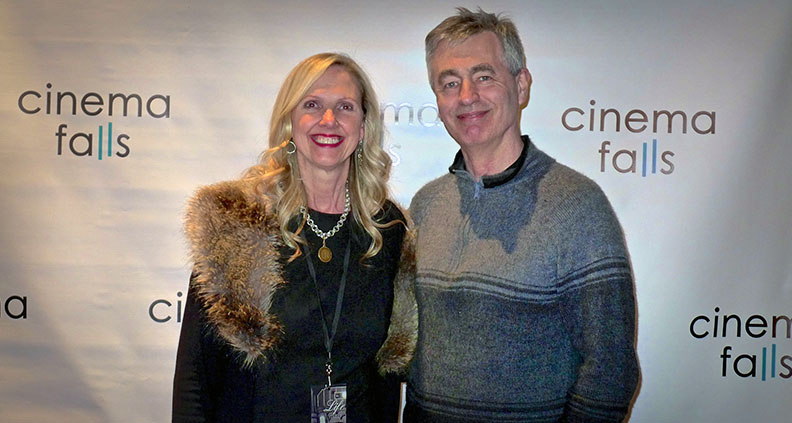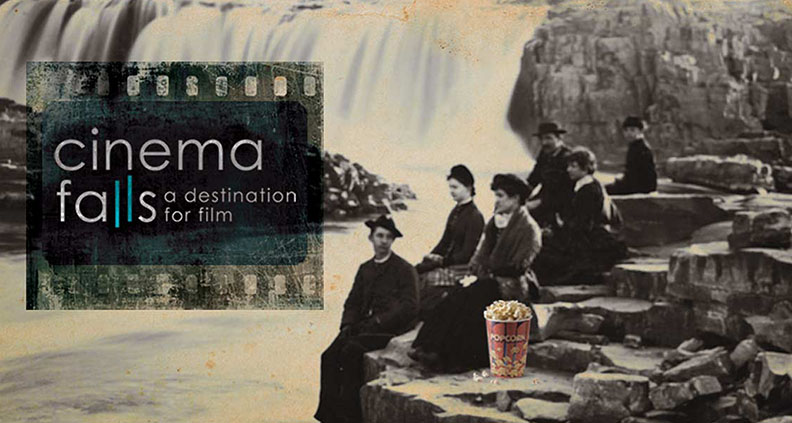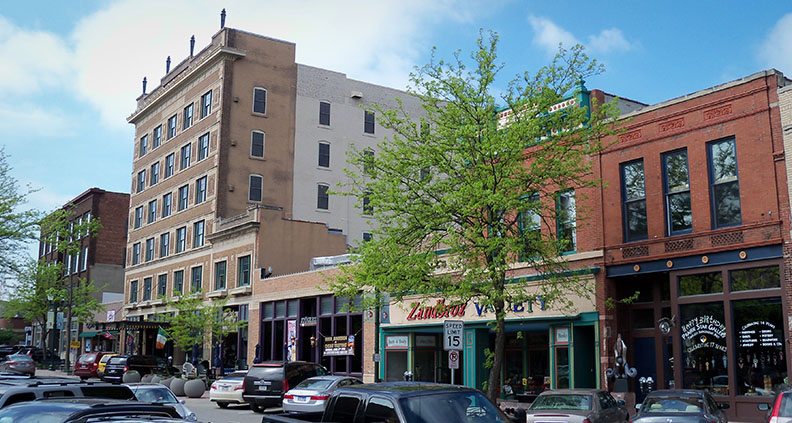Member Lens: Julie Anderson Friesen Brings Her Love of Art House Cinema Back Home
In our new Member Lens series, we’re spotlighting a cross-section of current Film Independent Members to see how they got where they are now, what they hope to do next and what being a part of Film Independent means to them.
***
Though her work and studies have taken her across the globe, Julie Anderson Friesen—this month’s featured Member Lens subject—has doubled-down on her commitment to nurturing and advocating for an active film community in her native Upper Midwest. As founder of the nomadic cinema exhibitor and film arts community organization Cinema Falls in Sioux Falls, South Dakota, Friesen has weathered a fair number of challenges in getting her passion project established, ranging from a lack of local cinema resources to the industry’s seemingly chronic indifference in engaging her part of the country.
A writer, TV host, university professor, video producer and ad exec, Friesen is an experienced hand on both sides of the camera, her love for film formed during countless hours spent in the back of her family’s station wagon, watching movies at the local drive-in. Blown away by Terrence Malick’s Days of Heaven, Friesen soon became a lifelong cinephile. But it wasn’t until 2012 when, frustrated at the lack of film culture in South Dakota, that Cinema Falls was born.
We recently spoke to Julie about her lifelong love of film, the inspiration behind Cinema Falls and the challenges the organization has faced both locally and as the result of Hollywood’s coastal bias, and a whole lot more.
In fact, the conversation was so wide-ranging we decided to split it into two parts. In Part One, Friesen talks about her personal relationship to film and discusses her experiences as a Film Independent Member. Part Two, coming next week, will be a Theater Crawl profile of Cinema Falls itself—stay tuned!
JULIE ANDERSON FRIESEN

Tell us a little bit about your background. When did you first develop an interest in cinema and filmmaking?
Friesen: Like so many in this industry, there’s a point where we fall in love with movie going, and another point where we fall in love with the movies themselves. My first experiences were at our local drive-in, because it was affordable for our large family of seven. For us, a drive-in was a was this mash-up of building a fort and camping and seeing a movie. A lot of my early movie memories are actually from the back our family’s station wagon. Unlike a lot of people I didn’t grow up in a larger Metro area, where my parents would take us to the theater regularly.
Oh, wow. Is it interesting for you to see drive-ins come back around now because of the pandemic?
Friesen: It really is. And of course it’s harder in the Upper Midwest come winter. I see other theaters doing it around here, but they’re not going to be able to continue doing it for very long [editors note: this interview occurred November 20]. That’s maybe not something people in other parts of the country think about. But here you really don’t want people sitting in their cars with the engine running without cracking a window, right? You know, drive-ins are so democratic. It just reminds me how important it is for people to have these affordable movie going experiences—especially as more theaters are leaning toward luxury.
So that’s how you developed your love of movie going. When did your appreciation for the craft of filmmaking enter the picture?
Friesen: Well, later in school I won a script competition and got to direct my classmates in the shooting of a film, so that set the hook. Then I saw Days of Heaven, by Terrence Malick. It was the first time I remember seeing a film so comfortable with silence and just treating the whole screen like a work of art. I didn’t have the vocabulary for what I was experiencing, but I was mesmerized. That film reeled me in for all time. I went to college up in the Twin Cities. They had an art house there, in Uptown, and I joined the campus Film Forum. And as Leonard Maltin said once at an Art House Convergence, if you can introduce film to college students, they can become art house lovers for life. He was right.

From there, how did your love of film intersect with your career?
Friesen: My interest in writing led to an undergraduate degree in English Literature. I studied abroad—mostly in England and Ireland—reading Yeats in Sligo, Shakespeare in Stratford, Wordsworth in the Lake District, Hemingway in Paris… My writing skills led to my career as an ad agency copywriter and creative director. One day the in-house video producer was fired, and instead of hiring a replacement with experience, my boss threw me into the deep end, handing me every script I’d written and saying, “You’ve already seen this in your mind, go figure out how to get it on the screen.” It was a real baptism by fire. It was both terrifying and exhilarating. Though they were all commercial projects, they were deeply formative in developing my respect for filmmakers and their crews—that’s something I still draw on to this day as an exhibitor lifting up filmmakers and their work. Eventually I launched my own ad agency, and a year later a post-production company, so I was still dealing in words and pictures and story.
How did all of that lead to the creation of Cinema Falls?
Friesen: Throughout all this, I was tracking down access to movies like Paris, Texas and Diva, as a film fan. Living where I did, it was a real Nancy Drew effort. But I was watching the Oscars one year and a woman from South Dakota—Barbara Schock—walked to the stage and won an Academy Award for Best Live Action Short. Something clicked. She profoundly inspired me. I was still doing work for my clients, but I started investigating the world of film festivals. And after attending Sundance and Palm Springs and Telluride, I decided I was tired of my community missing out on being part of the larger film conversation, and I wanted to do something about it. Cinema Falls was born at that moment. Cinema Falls was sort of a mid-career shift, piggybacking my other career.
Tell us a bit about your experiences as a Film Independent Member and with Film Independent as an organization.
Friesen: As far as the journey to Film Independent, it’s important to understand that I didn’t have any resources. I didn’t have a mentor, no relationships with distributors. Nothing. I had to be what I call a “cinema gumshoe,” because I was going to build this organization, but I had no real tools. I needed resources, so I started delving into industry publications. And you don’t have to do that for very long until you learn that the Spirit Awards are the Oscars of independent film—and then that led me to Film Independent. I started reading through everything on the site and paying more attention. When I looked into Film Independent, all the perks and events, at that time, were centered around LA. It would have been easy to look at that and think, “What’s the benefit to me as a member living here in South Dakota?” But I felt compelled to support the organization. There were other organizations I joined, and I let my memberships lapse. But because FI is an organization that is going to lift up and celebrate the work of independent artists, filmmakers and creatives, I just felt compelled to lend them my support. There were times when I wondered whether I should continue, but for me it’s remained a tether to an industry that often feels so far away. And one that, to be honest, regularly ignores the Midwest—it’s such a one-way street.

We’re always trying to make ourselves more relevant to film lovers and filmmakers nationwide. I appreciate that it must be frustrating to do this sort of work outside the bubble we take for granted here.
Friesen: Yes, we’re a significant part of cinema exhibition, and we can’t get anybody to come to the Midwest, not even to do a circuit ride. We don’t all have an Alexander Payne like Omaha does, though lately that seems to have presented some issues that hopefully resolve–but still, the angels are few and far between. And Film Independent has far more resources than the rest of us. I’ve stayed involved with Film Independent because when I have communication with your Membership department, they know me and they respond to me. And frankly, the pandemic has made Film Independent more relevant to me than ever, because my Membership benefits are now enjoyable remotely. You’ve found a way to bridge the gap and bring me those resources virtually, so your world opened up to include me in a much more meaningful way.
To learn more about Julie Anderson Friesen, please visit Cinema Fall’s website. To become a Member of Film Independent—and possibly be featured in a future edition of our Member Lens series—just click here.
More Film Independent…
(Header: a 2020 Cinema Falls Oscar ballot; source: @CinemaFalls Facebook)